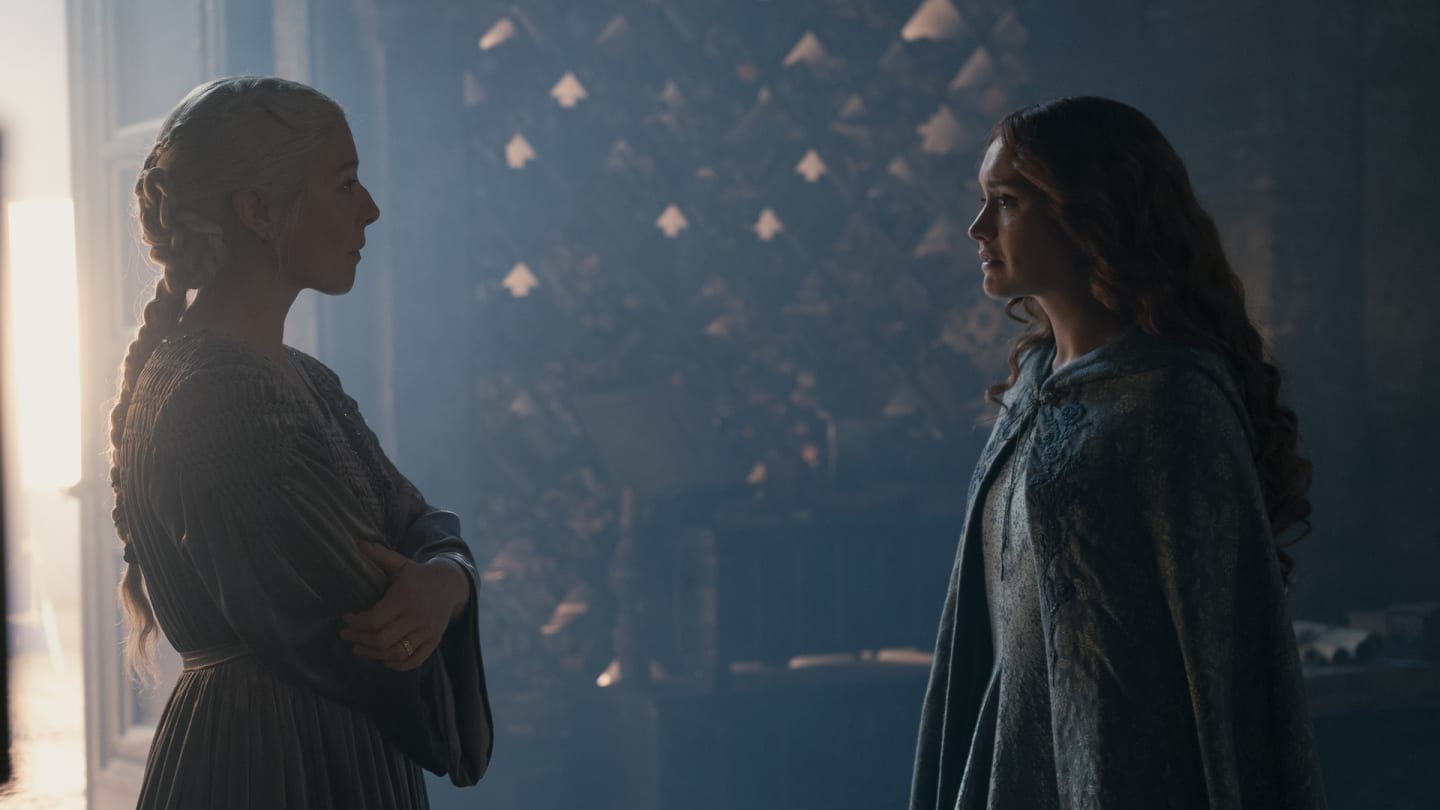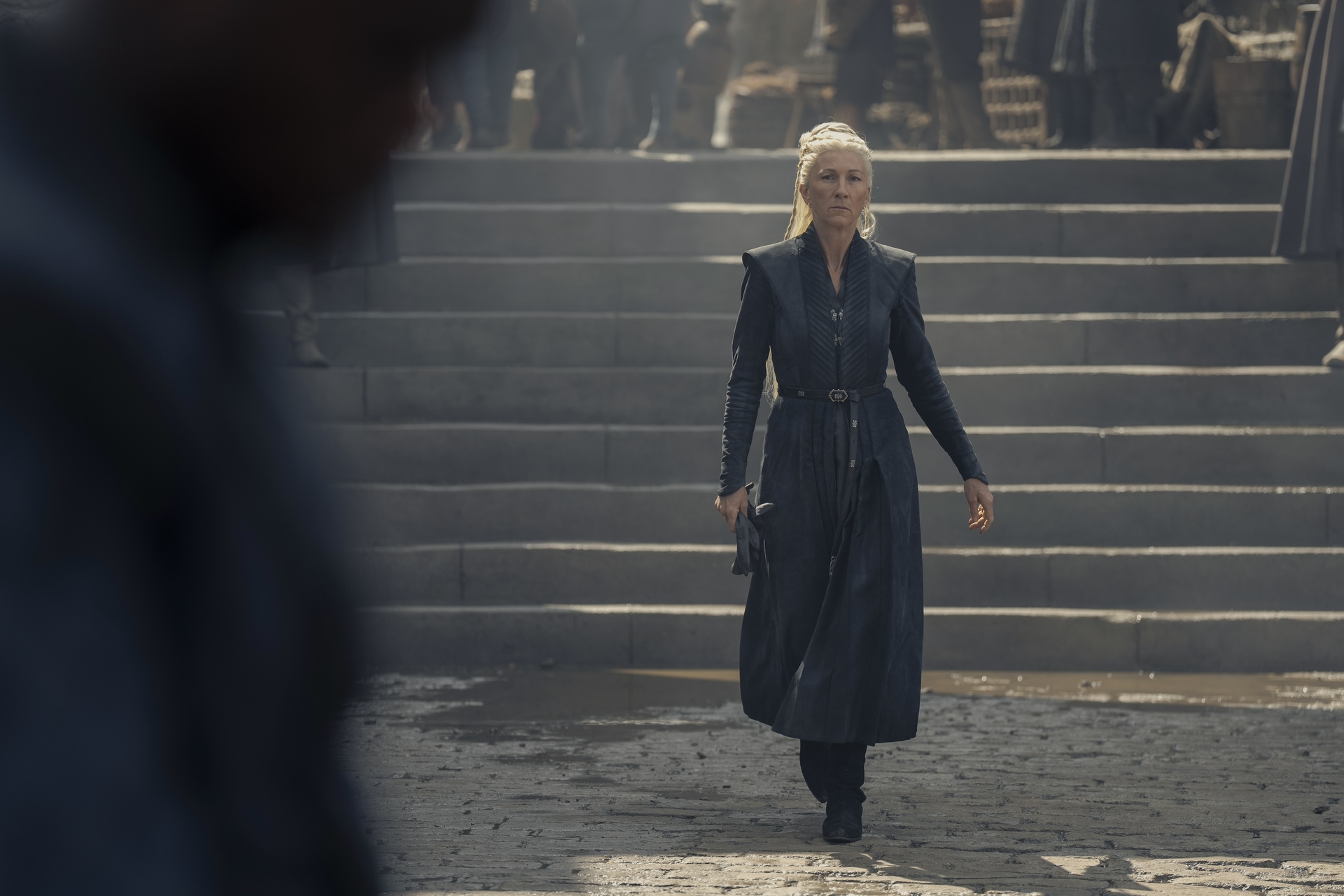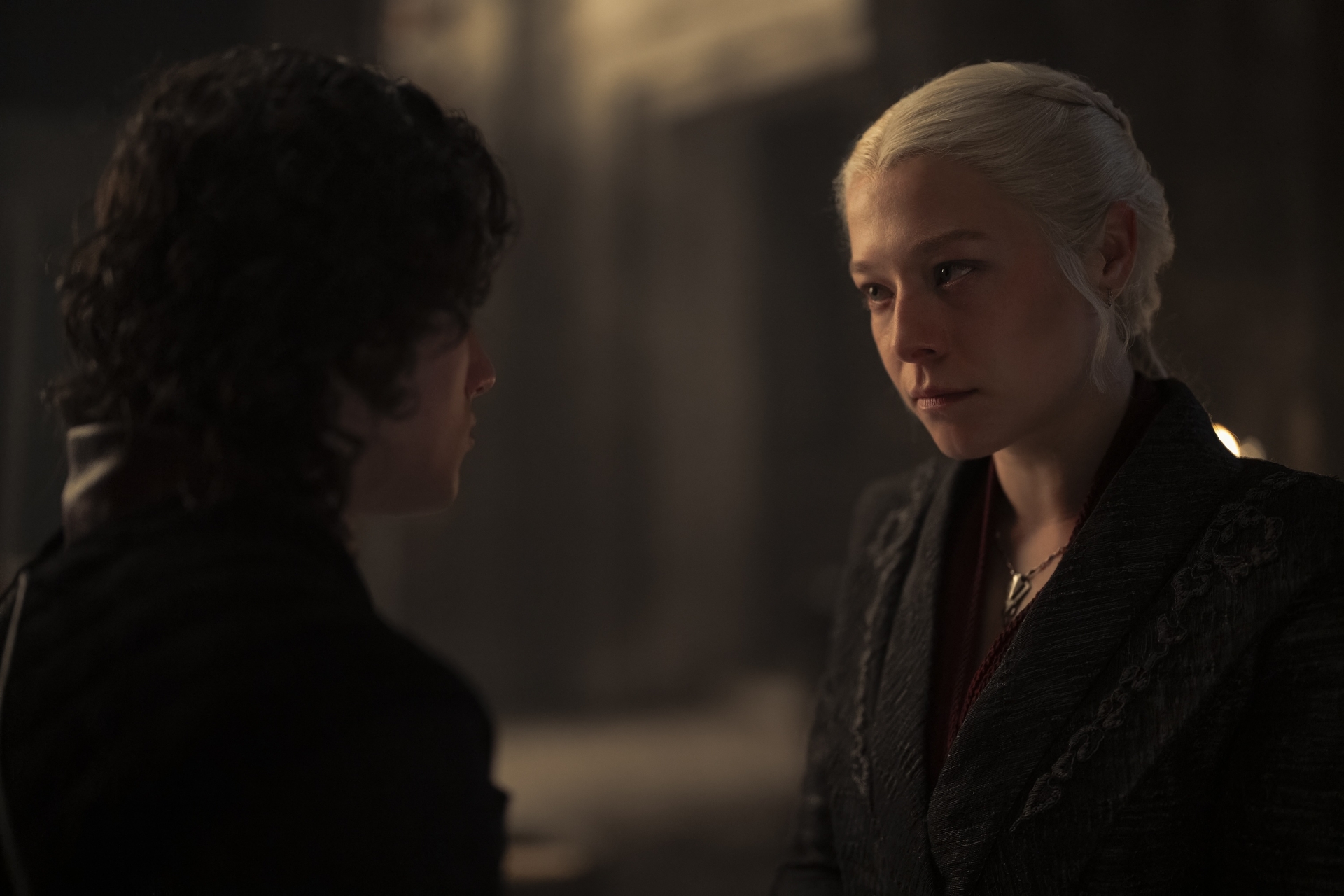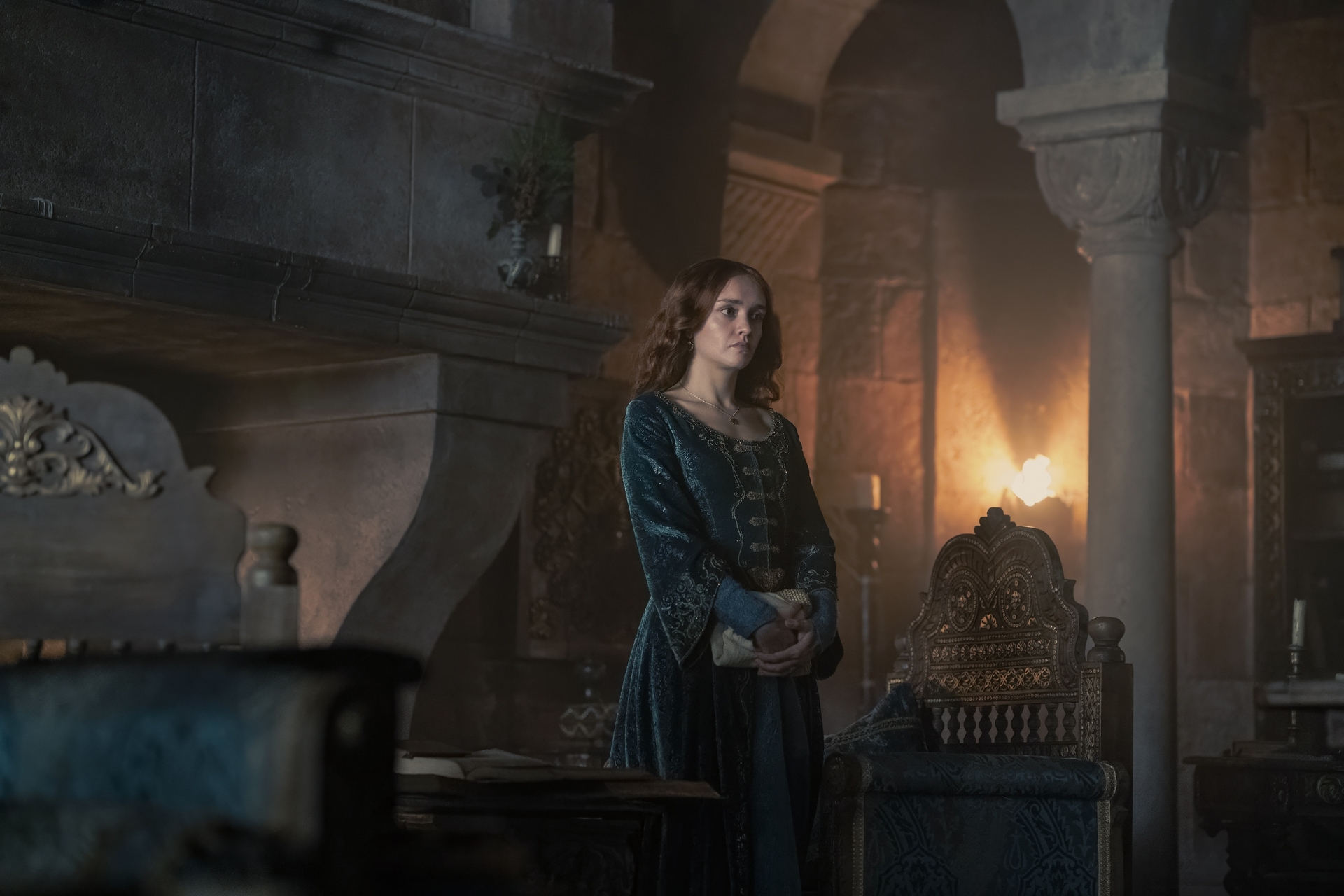
As a woman who has spent countless hours watching political dramas and historical epics, I find myself deeply moved by the strong female characters in House of the Dragon. Rhaenyra, Alicent, and Rhaenys are all complex women, each grappling with their own unique struggles in a male-dominated world.
In the hit series House of the Dragon on HBO, women are portrayed as being at the forefront, yet they’re frequently sidelined. Despite possessing all the necessary qualities – lineage, temperament, skill, knowledge, law, and tradition – the main female characters in House of the Dragon are consistently denied the full power they would wield if they sat on the Iron Throne. The series doesn’t just reflect misogynistic realities; it offers a peek at what Westeros is overlooking by neglecting to place women like Alicent Hightower or Rhaenyra Targaryen on the Iron Throne. By doing so, House of the Dragon encourages viewers to ponder what we’re missing out on when we fail to promote more women into top leadership roles in our own society.
Let’s start at the beginning, shall we?
In the opening scenes of the show, King Jaehaerys Targaryen convenes a council where the lords of Westeros are asked to choose between two potential heirs to the Iron Throne: his grandson Viserys or his granddaughter Rhaenys. It’s no surprise that Viserys is chosen, though it’s revealed later that he never desired the throne. However, Rhaenys possesses both the royal lineage and disposition that would have made her a capable ruler.

In the world of House of the Dragon, Rhaenys standing by as a lord is analogous to an original sin. This is because Rhaenys, known as “The Queen Who Never Was,” sets a unique precedent when Viserys names his daughter, Rhaenyra, as his heir to the Iron Throne. Since no woman has ever inherited the crown before, people fear that the Seven Kingdoms will experience conflict and instability. As it turns out, their fears prove accurate; upon Viserys’ death, a power struggle ensues, with the Hightowers manipulating events to place Viserys’ son Aegon on the throne instead of Rhaenyra, igniting “The War That Never Quite Happens” (at least until Season 3…presumably).
Additionally, since it seems that three misfortunes often occur together, after Rhaenys is denied the crown and Rhaenyra is barred from it, Alicent Hightower, the last female candidate with a claim, unfortunately does not get to ascend the Iron Throne. Although she served as an effective ruler during her late husband Viserys’s poor health and was technically the Queen of the Seven Kingdoms, the members of the Small Council treat her previous service as if she had merely been heating up a meal. Sadly, when given the chance to lead her kingdom in war, they prefer Aemond, her son, over her for the position.
When Alicent’s proposal to act as regent instead of her injured son Aegon is turned down by the Small Council, some members explain their choice by stating that they need a strategic mind for the current circumstances, someone whose abilities would aid them in conducting war. Furthermore, Larys Strong discloses another motive behind this decision, questioning, “Wouldn’t it be problematic if, following Rhaenyra’s coronation, we placed a woman into power from our own ranks?”
Through his query, Larys implicitly admits that bias sparked the war and further bias sustains it. By this action, the Greens pledge to inflict violence, famine, dragonfire, and death upon the Seven Kingdoms’ citizens to preserve a customs of misogyny. In this instance, the series strikingly demonstrates what the denizens of King’s Landing and entire Westeros overlook by not adopting a woman as their sovereign: tranquility.
Although peace might not be as captivating on screen, the unfolding drama between Rhaenyra and Alicent offers insight into their thought processes, rule, and lifestyle. These two women, who display remarkable strength and courage, are portrayed not just as they meet societal expectations of masculinity, but more so in ways that resonate with women’s experiences. Their positions of power highlight the potential advantages of using such attributes effectively.

In the second season, Rhaenyra frequently ponders her son Jacaerys and the dual responsibilities she senses towards him, both as a mother and a queen. For her, these roles are deeply intertwined – good parenting equates to good leadership, and the reverse is also true. In episode 6 of season 2, titled “Smallfolk,” Rhaenyra questions herself, “Can I rule a kingdom if my own son questions me?” Although ruling a kingdom and raising a child (specifically a moody, limited-minded complainant like Jace) are clearly distinct tasks, Rhaenyra portrays a ruler who feels her duty to her subjects as strongly as her duty to her offspring. Leaders like that are exactly what I want.
In the year 2024, it’s still predominantly women who shoulder the responsibilities of parenting, caregiving, and education. Consequently, women are more likely to find themselves in positions of power, as their experiences shape them significantly. Rhaenyra, a character navigating a man’s world, embodies this reality exceptionally well. Her defiance of traditional norms not only challenges her own role but also the typical archetype, serving as a reminder that when we exclude women from power, we deprive ourselves of potential leaders who prioritize the welfare of future generations.

It might be contended that Alicent stands out as the most accomplished character throughout the series, given her remarkable ability to accomplish tasks more efficiently than others. Regrettably, her responsibilities often involve actions such as winning over, marrying, and sharing intimacy with a man much older than herself, thereby bolstering her son Aegon’s questionable claim to the throne, and recruiting the espionage skills of an individual with an unusual fascination for feet. Despite enduring numerous hardships, Alicent remains steadfast in her service to her House and family.
“The trait of ‘excessive concern for others at the expense of one’s own well-being and aspirations’ isn’t typically associated with men. This is a characteristic that defines Alicent. While her storyline is often sad, it also leaves us wondering, What if? What if her father Otto hadn’t manipulated his daughter for his ambitions? What if Alicent pursued power for herself instead of her son, Aegon? What if those around her acted with the same caution amidst turmoil?”
In this significant scene, Alicent and Alicent Hightower face off with Rhaenys, a queen who never ascended to the throne, following Alicent and the Greens’ seizure of the throne from Rhaenyra. Alicent requests Rhaenys’ loyalty to Aegon. Intriguingly, Rhaenys scrutinizes Alicent intently, almost as if she was observing her for the first time. At last, she remarks, “Alicent Hightower, you are wiser than I thought.” There’s a hint of astonishment in Rhaenys’ tone, but there is also an undercurrent of appreciation. Despite eventually departing King’s Landing and aligning with Rhaenyra, Rhaenys appears to view Alicent as a peer during this exchange, as another woman denied the fullness of her power. As the scene progresses, Rhaenys approaches Alicent and confides, “Have you ever pondered yourself on the Iron Throne?” The question seems innocent enough, but it carries an undertone of encouragement. It feels like if Alicent didn’t step back, if she had responded with “Yes. I yearn for the Iron Throne,” Rhaenys might have aided her in claiming it.
In the world of House of the Dragon, Rhaenys, Alicent, and Rhaenyra are sidelined, despite their rightful claim to power and influence. Yet, this series offers a glimpse into an alternate reality where women lead not out of greed or dominance, but through compassion and insight. This raises the thought-provoking question: What if we nurtured more female leaders in our own society?
Read More
- Clash Royale Best Boss Bandit Champion decks
- Vampire’s Fall 2 redeem codes and how to use them (June 2025)
- World Eternal Online promo codes and how to use them (September 2025)
- Best Arena 9 Decks in Clast Royale
- Mobile Legends January 2026 Leaks: Upcoming new skins, heroes, events and more
- Country star who vanished from the spotlight 25 years ago resurfaces with viral Jessie James Decker duet
- How to find the Roaming Oak Tree in Heartopia
- M7 Pass Event Guide: All you need to know
- Solo Leveling Season 3 release date and details: “It may continue or it may not. Personally, I really hope that it does.”
- Kingdoms of Desire turns the Three Kingdoms era into an idle RPG power fantasy, now globally available
2024-08-31 17:41